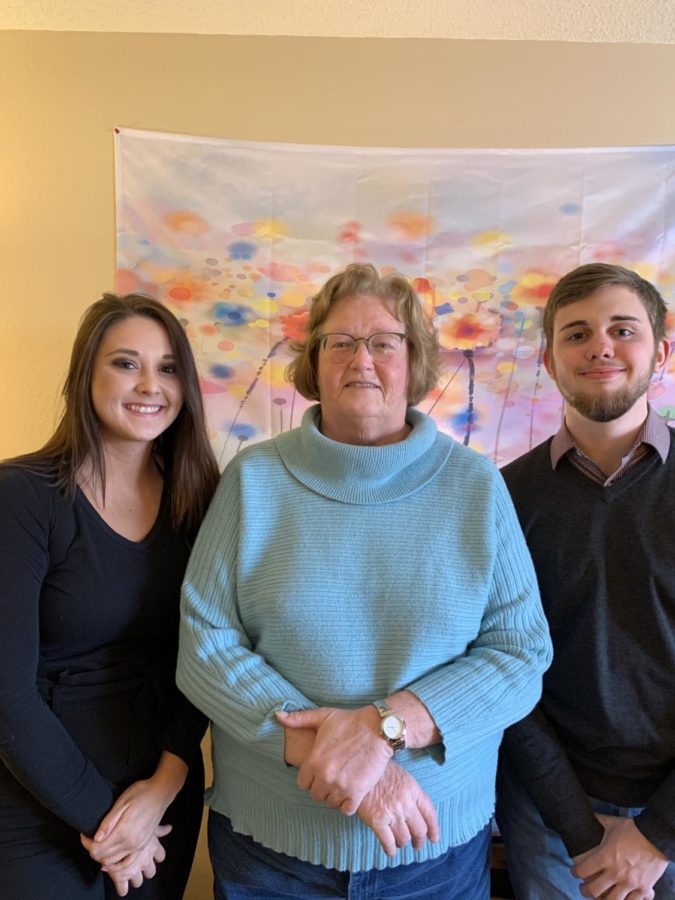ACCESS provides support for victims of felony-level crimes as well as sexual assault
The ACCESS Homicide and Violent Crimes team consists of of a group of three people, two of which are interns.
February 26, 2020
The Assault Care Center Extending Service and Support (ACCESS) supports more than just sexual assault and domestic violence victims in Iowa. It also supports victims of violent crimes.
ACCESS provides services to victims of violent crimes in Boone, Marshall and Story Counties. This Homicide and Violent Crimes team was created three years ago to serve local Iowans in need.
“Our division focuses on felony-level crimes, like murder in the first and second degree, robbery, burglary, those kind of crimes, and we provide services to victims of those crimes,” said Jon Meyer, certified victim advocate for ACCESS.
Meyer said there are two main services the Homicide and Violent Crimes team provides.
The largest is helping victims with filling out Crime Victim Compensation applications and restitution requests.
“Those applications are basically a form that victims can fill out that can cover costs for funerals, transportation, medical bills, it covers a range of options,” Meyer said. “That’s one of the ones we push the most because many people don’t know about it, and we want to get them help.”
Meyer said a Crime Victim Compensation application can last for years as long as it is filled out soon after the crime, so if someone needs help with a cost related to the crime years after the crime happened, they will have funds available.
The second biggest service is just walking victims through different processes.
“We just walk them through and are just there for them throughout the entire process if they want us to,” Meyer said. “We can attend hearings and arraignments, meet with Story county attorneys, if there is a deposition, we can go with them. We help them with victim impact statements, we help them write it if they want or read it if they need it.”
Some of the other services that the team provides includes counselors for death notification and support after a homicide, information and referrals for services, assistance with funeral arrangements, advocacy to support victims through the criminal justice system, accompaniment to law enforcement/county attorney meetings and court proceedings, emotional support, family and individual counseling, assisting victims in finding housing and/or transportation, providing information on victim’s rights and a 24 hour crisis line: 855-983-4641.
These services are provided to victims of felony crimes. These include murder in the first and second degree; attempted murder in the first and second degree; robbery; extortion; burglary in the first and second degree; attempted burglary in the first and second degree; arson in the first degree; kidnapping; felony assaults including willful injury, intimidation with a weapon, etc.; homicide and serious injury by vehicle; and felony hate crimes.
“Those can be very traumatizing and hard events for someone, and this team is important because people need help when these kinds of things happen,” Meyer said. “It is also maybe important specifically in Ames because it is a college town, and if something like that would happen to a college student, they might not have the family support to go through these events.”
ACCESS arose from the need to confront and combat the issues of sexual assault and domestic violence in Story County.
Established in 1976 as a rape crisis center, ACCESS services were expanded over the years to include a 24-hour crisis hotline and shelter for victims of domestic violence and their children.
In 1981, ACCESS opened its first shelter facility, a place where survivors and children could share a safe environment and more readily receive the services its growing staff and volunteers were ready to provide. ACCESS continues to serve Story, Boone, Greene, Marshall and Tama counties to this day.
ACCESS’ mission is “to address the roots and impact of domestic and sexual violence through services that enhance safety, empower survivors and promote understanding and social justice within our community,” according to the ACCESS website.
ACCESS also has other crisis lines that include a sexual abuse crisis line at 515-292-5378 or toll-free at 800-203-3488; a domestic violence crisis line at 515-292-0519 or toll-free at 855-983-4641; and a housing/sheltering services crisis line at 515-292-0543 or toll-free at 855-696-2980.







